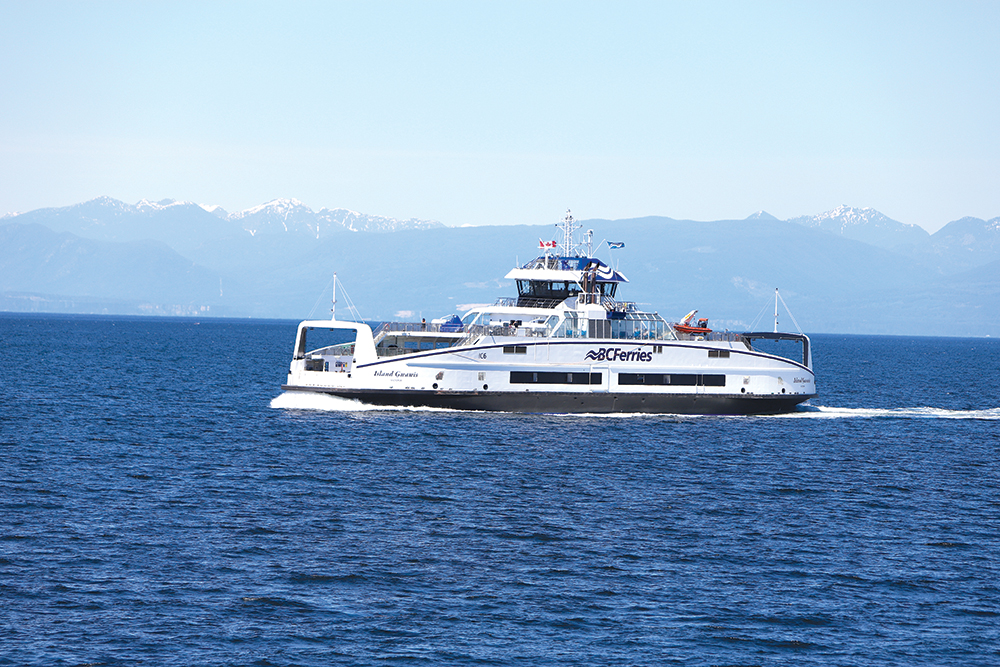Derek Kilbourn
Sounder News
BC Ferries announced this past Monday that it is terminating the use of Ferry Advisory Committees.
Steve Earle and Heather O’Sullivan sit as the Co-Chairs for the Gabriola Ferry Advisory Committee.
There are 13 FACs currently listed on the BC Ferries web site.
The announcement came during a non-public meeting between BC Ferries and the Chairs of those 13 FACs.
Earle said, “I am saddened by this announcement because it means that an important link in the ferry communication system will be severed. The FACs around the coast hold many decades of experience with ferries as well as critical route-specific understanding that the BCF staff in Victoria are lacking. It seems that BCF has decided to base future operational decisions on anonymous suggestions from individuals, as opposed to carefully considered recommendations from the FACs. I urge Gabriolans to tell BCF what they think.”
Earle and O’Sullivan provided a brief press release to the Sounder shortly after the meeting concluded.
It read, “BC Ferries has just announced, via a conference call with FAC members, that they are terminating the FAC process. It appears that they are planning, instead, to rely more on digital input directly from community members, although FAC members have been asked to work with BCF between now and April to help them design how communities will be engaged in the future.
“BC Ferries said that they have heard that coastal residents want to be able to communicate directly with the corporation, although they don’t seem to have asked if people think that the FAC mechanism isn’t effective.”
Trustee Susan Yates, who sits on the current Gabriola FAC as representing the Islands Trust, said, “having watched and listened to how all coastal FACs represent their communities, I cannot think of a better way to garner widespread input from citizens. and present it in a cohesive manner to BCF. Certainly our FAC, with Steve and Heather as Chair/Co-Chair, has done an exemplary job of this.
“A scattershot approach diminishes/exterminates good community discussions about ferry issues, and also rids BCF of responsibilities to groups that do a good job of representing community concerns.
“No legitimate group now will be able to report to their communities on BCF operations and plans regarding our coastal highway system.”
Gabriolan Sheila Malcolmson, newly-elected as the MLA for Nanaimo-Gabriola Island, said on Monday, “Gabriola’s Ferry Advisory Committee has done vital work that’s had direct benefit for our community: on traffic safety, refuelling runs, and schedules that work for commuters.
“I have concerns about what BC Ferries’ decision means for community engagement, and it is my expectation that BC Ferries will work with coastal communities for the benefit of ferry users.”
Media representatives from the Ministry for Transportation and Infrastructure (MOTI), stated, “As BC Ferries is an independent company, the ministry was not required to be consulted or to approve the decision.
“The ministry understands people may have concerns about what this means for community engagement, and it is the ministry’s expectation that BC Ferries will work with coastal communities in a meaningful way moving forward.”
As part of eliminating the FAC model, BC Ferries says it is launching a process to design a new engagement model that better addresses the evolving needs of growing coastal communities, reflecting the importance of more effectively incorporating digital engagement.
Morningstar Pinto, BCF Executive Director of External Engagement said, “a lot has changed in the last 30 plus years since the Ferry Advisory Committee (FAC) model was first created, and it’s time for us to have a look at our broader engagement process to make sure that it’s accessible, inclusive, and representative of a broad range of input.”
BC Ferries will collaborate with FACs, community residents, local governments and MLAs, First Nations, and other interested and impacted groups to create a more inclusive and responsive engagement model, which will replace the FACs and be in place starting in May 2025.
“As the FAC model winds down, it’s important to recognize the volunteerism and dedication of past and present committee members. Their contributions have made our system better, and their insights on what worked and what can be improved will help contribute to a more modern process,” says Pinto.
Gibsons Mayor Silas White spoke in in favour of the change saying, “our residents have spoken through lack of attendance and confidence at recent public Ferry Advisory Committee meetings. Our community agrees it is time for a more inclusive and dynamic approach, and we look forward to working with BC Ferries to develop a process that targets a broad and democratic representation of voices, and most importantly, delivers results.”
BC Ferries says the change comes in response to feedback from the public, local governments and First Nations—as well as customer survey results where over 80% of respondents indicated a preference for more digital engagement options. The company says it C aims to implement new engagement structures and processes to reach and hear from a broader audience.
Digital tools, including real-time surveys, interactive feedback portals, and virtual forums, will enable wider participation from anywhere, at any time.
It’s expected the new model will both maintain in-person outreach and include digital-first opportunities to strengthen the inclusivity, depth and authenticity of the engagement work. In the meantime, project-specific engagements will continue as normal.
Pinto said, “our goal with this new model will be to enable and amplify a diverse range of voices to better ensure the people who live in and represent the communities we serve can play an active role in helping inform decisions about the services they receive.”
BC Ferries says leading up to May 2025, BC Ferries will undertake a three-part research and redesign process informed by feedback and input from FAC members, community groups, local governments and MLAs, First Nations, and interested and impacted groups, to support the development of the future engagement model.
The ferry corporation states that on on April 30, 2025, the current FAC process will end and be replaced by the newly developed model. Those interested in participating in or providing feedback into the engagement development process can visit https://www.bcferriesprojects.ca/in-your-community for updates and to sign up for notifications.
Heather O’Sullivan said, “The opinions that follow are mine and do not necessarily reflect those of the rest of the FAC.
“To say that today’s announcement was a bit of a shock would be an understatement.
“Having sat on the Gabriola FAC since 2014, first as Islands Trustee and then as Co-Chair, I have considerable experience with the workings of the committee. Our relationship with BC Ferries may have sometimes been contentious, but I see that as having been a necessary part of representing the interests of the community to a corporation that, frankly, often seems very removed from the day-to-day realities of the islands it’s meant to serve.
“BCF claims that this is all about ushering in a new and better era of community engagement. But engagement is a two-way street. The high handed, non-transparent approach that they’ve just taken to shutting down the FAC process (including refusing to record and share links to the meetings at which they presented their decision) is much more indicative of the problems with communication than anything coming from the FAC end.
“BC Ferries has dressed their announcement up in a lot of positive spin, but the long and short of it is that FACs are out, and I don’t believe for a minute that is because they intend to suddenly pay more attention to the voice of the individual user. Advocacy works when people speak together, and that’s what the Ferry Advisory Committees allow us to do. That’s why we are relevant. That’s why we are important.
“I have grave concerns about what this means for Gabriola, especially as regards the extensive upcoming work at Descanso Bay and Nanaimo Harbour to prepare for the new battery-electric hybrid vessels, which will have dramatic impacts on service. If you agree that shutting down the FACs is bad for the communities we serve, please speak up on our behalf.”
Earle added that, “If you think that the FAC system is an effective way to communicate with BC Ferries, and would like to see it continue, you should say as much to BCF by emailing these members of BC Ferries.”
• Morningstar Pinto, Executive Director of External Relations, at Morningstar.Pinto@bcferries.com
• Nicolas Jimenez, President & Chief Executive Officer, BC Ferries, nicolas.jimenez@bcferries.com
• Lindsay Matthews, Vice President, Public Affairs BC Ferries, lindsay.matthews@bcferries.com





Recent Comments